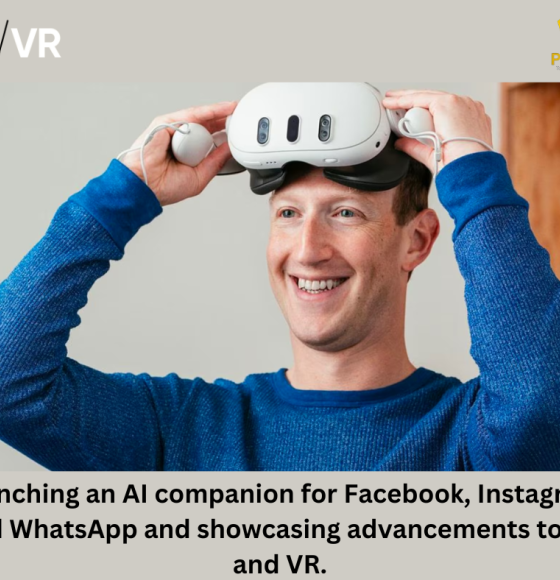In addition to a bevy of new products like the new Meta X Ray-Ban smart glasses, new iteration of Meta Quest, and AI assistants for WhatsApp, Facebook, and Instagram, Meta has shown how it intends to merge AI with AR and VR.
On Wednesday, Mark Zuckerberg, the CEO of Meta Platforms, revealed a number of new consumer products powered by AI. These developments include upgraded virtual reality headsets, responsive smart eyewear, and bots that can produce photorealistic photos.
The confluence of the virtual and physical worlds is something that Zuckerberg stressed about these goods. He emphasized Meta’s dedication to offering cost-effective or free AI solutions that easily fit into our daily lives.
Numerous new AR/VR gadgets:
Zuckerberg made the announcement while speaking in the main courtyard of Meta’s large Silicon Valley campus. The new Ray-Ban smart glasses will start shipping on October 17 and cost $299. As opposed to the photo-capturing functionality of the previous iteration, these glasses will have a new Meta AI assistant and the ability to live stream what the wearer sees directly to Facebook and Instagram.
The newest Quest mixed reality headset will begin arriving on October 10 in addition to Zuckerberg introducing Meta’s first consumer-facing generative AI products. Included in this is a chatbot by the name of Meta AI that can produce both text responses and photorealistic pictures.
“Sometimes we innovate by releasing something that has never been seen before,” said Zuckerberg. However, occasionally we innovate by taking something fantastic but extremely pricey and making it accessible to everyone or even free.
Meta AI’s progress
Meta AI will be integrated into the smart glasses as an assistant, with a beta rollout beginning in the United States. A software update planned for next year will empower the assistant to identify objects and locations and provide language translation capabilities.
Meta developed Meta AI using a custom model based on the potent Llama 2 large language model, which the company made available for commercial use in July. The chatbot will have access to real-time information through a partnership with Microsoft’s Bing search engine.
Additionally, Meta announced that it is developing a platform that will allow developers and individuals to create their own custom AI bots. These bots will have profiles on Instagram and Facebook and eventually appear as avatars in the metaverse. To demonstrate the tool’s capabilities, Meta created a set of 28 chatbots with distinct personalities modelled after celebrities like Charli D’Amelio, Snoop Dogg, and Tom Brady.
In addition, Meta disclosed that it is creating a platform that would enable programmers and individuals to design unique AI bots. These bots will eventually show up as avatars in the metaverse and have profiles on Facebook and Instagram. Meta developed a set of 28 chatbots with various personalities modeled after famous people like Charli D’Amelio, Snoop Dogg, and Tom Brady to showcase the tool’s possibilities.
According to TECHnalysis Research’s principal analyst, Bob O’Donnell, “I don’t see Meta monetizing AI products for quite some time, and I think it will wind up being more indirect. They appear considerably more eager to contribute to the creation of a platform for usage by other programmers.
Zuckerberg also disclosed that beginning in December, Quest would support Xbox cloud gaming.
Calming down investors:
These announcements show Zuckerberg’s approach to this year’s investor interest shift away from augmented and virtual reality and toward artificial intelligence. The parent firm of Facebook and Instagram came under fire from investors last year for lavish spending on the metaverse, which resulted in massive staff reductions as Zuckerberg pursued his vision. As a result, the stakes for this event were high.
Given the more than $40 billion in losses since 2021, investors are seeking for indicators that the company’s investment may someday pay off, while developers are eager to investigate the potential applications for Meta’s newest hardware gadgets.

















